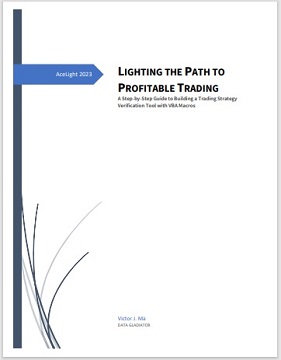Stock Trading 101: Beginner Strategies and Tips for Making Smart Investments
|
|
Have you ever wondered why the stock market is called a "bull" or a "bear"
market? Is it because they're predicting the future of the animal kingdom?
Maybe it's because traders are secretly zookeepers? The truth is, nobody
really knows.
But don't worry, you don't need to be an animal expert
to make smart investments in the stock market. All you need is a bit of
knowledge and a lot of luck (or a lot of knowledge and a bit of luck,
whichever works for you).
In all seriousness, the stock market can
be a bit intimidating for beginners. With all the numbers, graphs, and
complicated jargon, it's no wonder that most people feel like they need a
degree in finance just to get started. So, get ready to learn the ins and
outs of stock trading, with a few jokes and puns thrown in to make things
more enjoyable. Who said finance can't be fun? Now, before we start, let me
warn you that the stock market is a bit like dating. You'll have to be
patient, take risks, and be prepared for the occasional heartbreak. But,
unlike dating, you don't need to swipe right to get started. So, put down
that phone and let's get to work!
1. Educate yourself: Before
investing in stocks, it is crucial to educate yourself on the basics of
stock trading. You need to understand what stocks are, how the stock market
works, and how to read stock charts. There are many online resources
available, including books, blogs, and videos, that can help you learn the
fundamentals of stock trading.
2. Do Your Research: Before investing
in a company, it's crucial to do your due diligence. Analyze the company's
financial statements, read up on industry news, and understand the company's
business model. This will help you make informed investment decisions.
For example, if you're interested in investing in a tech company,
research the company's revenue growth, profit margins, and any upcoming
product releases. You can also analyze the competition in the industry and
see how the company stacks up against its peers.
2. Set realistic
goals: When you start investing in stocks, it is important to set realistic
goals. Do not expect to make huge profits overnight. Instead, focus on
long-term gains and aim for a steady increase in your investment portfolio.
Determine how much money you can afford to invest and set a budget for
yourself. This will help you avoid overspending or taking unnecessary risks.
3. Diversify your portfolio: Diversification is key to a successful
investment strategy. Do not put all your money in one stock or industry.
Instead, spread your investments across different sectors to minimize risk.
This way, if one sector or stock is not performing well, your overall
portfolio will not suffer.
For example, if you have a portfolio of
ten stocks, consider investing in different sectors such as technology,
healthcare, energy, and finance. Also, diversify across geographies by
investing in both domestic and international companies.
4. Start
small: If you are a beginner, start with a small investment. This will help
you learn the ropes without taking on too much risk. As you become more
experienced and comfortable with the stock market, you can increase your
investment amounts.
5. Keep Your Emotions in Check: The stock market
can be volatile, and it's easy to get caught up in the excitement or panic
of the moment. However, emotional decisions often lead to bad investment
choices. It's crucial to remain calm, patient, and disciplined in your
investment strategy.
For example, if a stock you invested in takes a dip,
don't panic and sell immediately. Instead, re-evaluate the company's
fundamentals and assess whether it's a temporary setback or a long-term
issue.
6. Have a plan: Before investing in stocks, it is important to
have a plan in place. Determine your investment goals, and decide how much
money you are willing to invest. Set a target price for each stock, and have
an exit strategy in case the stock price drops. Having a plan will help you
stay focused and avoid making impulsive decisions.
For example, you
can create a plan that outlines how much money you want to invest each
month, what percentage of your portfolio you want to allocate to each stock,
and your long-term investment goals. This plan will help you stay focused
and disciplined in your investment decisions.
7. Follow market
trends: Keep up with the latest market news and trends. Follow financial
news outlets and keep track of the performance of the stocks in your
portfolio. This will help you make informed decisions about buying and
selling stocks.
8. Use limit orders: When buying or selling stocks,
use limit orders. A limit order allows you to specify the price at which you
want to buy or sell a stock. This way, you can avoid buying or selling a
stock at a price that is higher or lower than you are willing to pay.
9. Be patient: Stock trading is a long-term game. Do not get discouraged
if you do not see immediate returns on your investment. Remember that
successful stock trading requires patience and discipline.
10. Beware
of Investment Fads: Investment fads, such as meme stocks or
cryptocurrencies, can be tempting, but they often come with high risk and
volatility. It's essential to do your research and understand the underlying
fundamentals of any investment before putting your money into it.
For
example, GameStop's stock price soared in early 2021 due to a social
media-fueled buying frenzy. However, the stock's price eventually crashed,
leaving many investors with significant losses. It's crucial to avoid making
investment decisions based solely on hype or social media buzz.
 Whether
you're a beginner or an experienced stock trader, it's crucial to thoroughly
test any trading strategy before using it in live markets. This means
conducting both back-testing and forward-testing to evaluate the strategy's
effectiveness and identify potential flaws or weaknesses. Testing is a
necessary step in the development and implementation of any successful
trading strategy, regardless of its complexity. By using these testing
methods, traders can gain valuable insights into the performance of their
strategies and make adjustments as needed to optimize their results. So, if
you want to succeed in the stock market, make sure to prioritize testing
before putting your capital at risk. Whether
you're a beginner or an experienced stock trader, it's crucial to thoroughly
test any trading strategy before using it in live markets. This means
conducting both back-testing and forward-testing to evaluate the strategy's
effectiveness and identify potential flaws or weaknesses. Testing is a
necessary step in the development and implementation of any successful
trading strategy, regardless of its complexity. By using these testing
methods, traders can gain valuable insights into the performance of their
strategies and make adjustments as needed to optimize their results. So, if
you want to succeed in the stock market, make sure to prioritize testing
before putting your capital at risk.
For more information, Click
LIGHTING THE PATH TO PROFITABLE TRADING: A Step-by-Step Guide to Building a Trading Strategy Verification Tool with VBA Macros to get the whole tutorial handbook for free!
And click Free Trial to download strategies testing tools, all for a 30-day Free Trial.
Click on Subscription to order more strategies testing tools to help your stock trading.
And finally, remember to never invest in a company just because your
favorite celebrity endorsed it. Unless, of course, you're willing to take
fashion advice from a politician wearing a woolly mittens on a sunny day.
In all seriousness, investing in stocks is no laughing matter, but that
doesn't mean we can't have a little fun along the way. So, keep these
beginner stock trading strategies and tips in mind, but don't forget to
enjoy the ride. And who knows, with a bit of luck, you might just end up
owning that yacht after all. Just don't forget to invite your friends along
for the ride!
|


|

Free Tutorial
Share
|
|
|
|